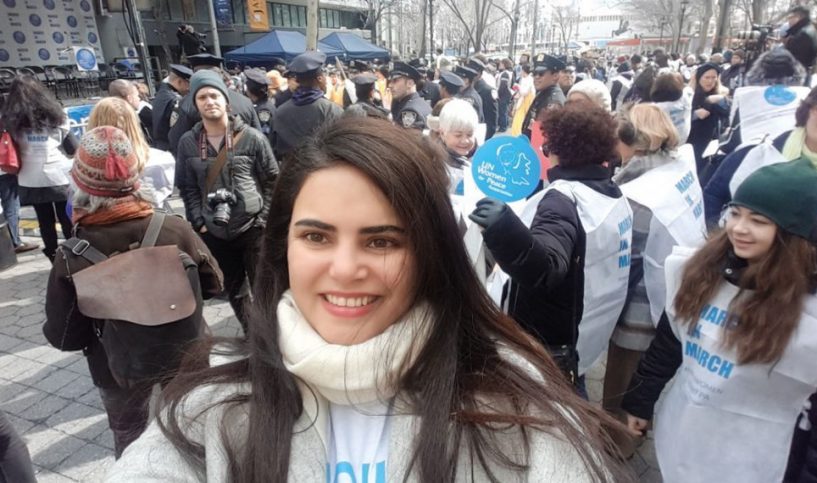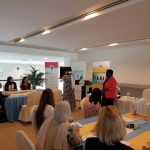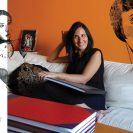Life works in mysterious ways. Alanoud Alsharekh started off her career by going to med school. It didn’t take her long to realize that medicine wasn’t for her, “I had moral and ethical conflicts,” she explained. She discovered that transferring to English Literature and Paleography is better suited for her. “I have a very analytical mind and I found that the level of analyzing and researching in this field befitting,” Alanoud laughed. Understanding and appreciating that every argument, opinion and thought must be backed by facts and references, Alanoud found herself amidst a whirlwind of politics. A founding member of the Soroptimist International Club Kuwait and Abolish 153, Alanoud’s current mission is to empower women with knowledge, rights and most importantly, the law.
Having returned to Kuwait after completing her Masters degree in applied linguistics, pregnant with her daughter, and at a pivotal moment of change, Alanoud found her calling. “We were debating the bill that would give women their political rights, and I got involved in that movement. We were fairly certain we were going to get it,” Alanoud explains. “And, we didn’t!” she laughs, “I think that set off a series of questions in me that gave me a taste for activism – there’s nothing like that rush of righteous anger when you’re on the side of good – and it also made me appreciate social policy change that comes from a grassroots level.”
Not agreeing with the social conformity of the hierarchy within households at meal times, Alanoud wanted to see a change. While women are expected to just listen to their male counterparts debating and discussing ideas and notions, Alanoud wants them to contribute to the conversations. This further ignited her interest in giving women their political and social rights – “[because] I’m not just a pretty background to your conversations!” she exclaimed.
Finding herself driven by her passions and the opportunities that present themselves around her, Alanoud was never one with a rigid plan. Starting off in the realm of academia, she opted for research because of her urge to document what was happening at the time: Women had gotten their right to vote. Involved in lobbying and supporting the female candidates at the time, Alanoud felt she needed to shift her focus towards research.
“I was lucky enough to receive some grants,” she explained. “I got the MEPI Grant as well as doing research for Freedom House and other organizations like the UNDP. They were all interested in the research I was doing: part of which was about migrant women workers.” This piqued Kuwait’s National Security Bureau’s interest. They approached Alanoud with a job offer: they needed someone with an academic background to handle their human right’s affairs in-house. After a two-year courtship with the offer, Alanoud took the job – “but I always took domestic security to mean regional.”
Still, her love for academia runs deep. A research associate at SOAS, Alanoud flies out once a year to teach a class there as well as several other part-time teaching residencies in Europe and the United States. But it’s the challenges she faces while teaching that keep her going. “While I was in California, I was speaking about contemporary issues in Islam and I was the first woman on a twenty-year program called Visiting Scholar from the Islamic World. I was wearing what I thought to be the universal feminist uniform,” she laughed. “After that, I got the student evaluations and some of them would say things like ‘She doesn’t look Muslim, she doesn’t talk Muslim – I don’t know what she’s selling but I’m not buying it.’ So you find yourself fighting against this engrained idea of what Muslims are supposed to look, talk, act and think like!”
Yet the several challenges she faced while teaching here in Kuwait were of a different caliber – especially when it comes to the subject of Humanities. “We [the teachers and administrators] needed to have lengthy discussions about whether we would teach the iconic artworks that really underpin Humanities – because it’s a very Western humanist concept – that was an issue more than anything else.” Alanoud felt it was gratifying nonetheless.
But not being able to discuss certain subjects and topics, because they’re considered taboo, frustrated her. From artworks such as the Venus di Milo to more personal matters like spousal abuse, certain things shouldn’t be discussed. Knowing that society doesn’t approve of publicly conversing about private matters, women who survived violent attacks aren’t encouraged to take legal action. This deeply troubled and frustrated Alanoud. The lack of conversation about such topics, and let alone the absence of much needed resources to help, needed to be implemented.
As a result, Alanoud, along with Amira Behbehani, Lulu Al-Sabah, Sheikhah Al Nafisi and Sundus Hussein, established an organization called Abolish 153. “It just so happened that these wonderful women, starting with Lulu, were at a stage in their lives where they wanted to turn to social work and philanthropy. This is when I brought their attention to this law that I uncovered while I was working on motivating female voters in 2006.” Having found ten legislations that she regarded as insulting for a progressive country like Kuwait, Alanoud banded with this group of women, against all odds, to publicly converse about violence. “Changing legislations is only a part of it,” Alanoud elaborated.
Over the last couple of years, Abolish 153 has been called upon to intervene in cases of violence against women. Proud of what they’ve achieved, Abolish 153 started raising flags and captured people’s attention. “[Now] I can see that there’s been a movement within parliament to really reexamine these legislations and I’m very proud to say that [the head of the comity] Salah Ashour asked a formal question to parliament: ‘Is Article 153 constitutional and if not, how can we remove it?’ Now it’s on record! No matter who comes onto the stage after, we’ve set the ball in motion.”
For those who are unaware of this particular article, Alanoud simply explained, “It justifies murdering female kin and it’s a strange justification. It’s not Sharia compliant, it’s in violation of our constitution and every human rights treaty signed by Kuwait. We’re better than this, as a people and as a country.” While there are specific rules and laws to follow, Article 153 has omitted them and is inherently flawed because it is easily abused.
Now, with the establishment of a child protection laws after a ten-year of struggle, Abolish 153 hopes to convince people that the next step would be to enact a law that would protect women. This way, those who are survivors of violence would have shelters, helplines and general resources to empower themselves. Now that they’ve gotten the word out, everyone is very aware of this article and all the similar legislations. Abolish 153 has paved the way for change and for giving Kuwait what it needs to be great.
Up Close & Personal Questionnaire:
What do you most value in your friends?
Loyalty and support without judgment.
What is your idea of perfect happiness?
Time with my children.
What is your greatest fear?
It’s morbid and I would rather not think about it.
What is the trait you most deplore in yourself?
Impatience and curt texting.
What is the trait you most deplore in others?
Unreliability.
Which living person do you most admire?
Besides my parents, I deeply admire the President of Uruguay Jose Muijica for donating 90% of his salary. I wish more politicians would do the same.
What is your greatest extravagance?
Alone time, and Michelin starred food.
Which words or phrases do you most overuse?
Awesome.
What is it that you most dislike?
Justification of violence.
Which talent would you most like to have?
To be musically gifted. If I could sing or dance or play an instrument, I would have had a different path in life.
If you could have any job, what would it be?
Lawyer…or opera singer.
What would you consider your greatest achievement?
Raising awareness around the existence of violent legislations and attempting to end them.
What is your most treasured possession?
My children.
What is your most marked characteristic?
My stubborn optimism.
Where would you most like to live?
Wherever my family is.
What are your favorite words to live by?
This too shall pass.
For more information about Article 153, Abolish 153 and what you can do, visit their website www.abolish153.org. You can also follow them on Instagram and Twitter @Abolish153 to keep up to date with all their incredible work.















